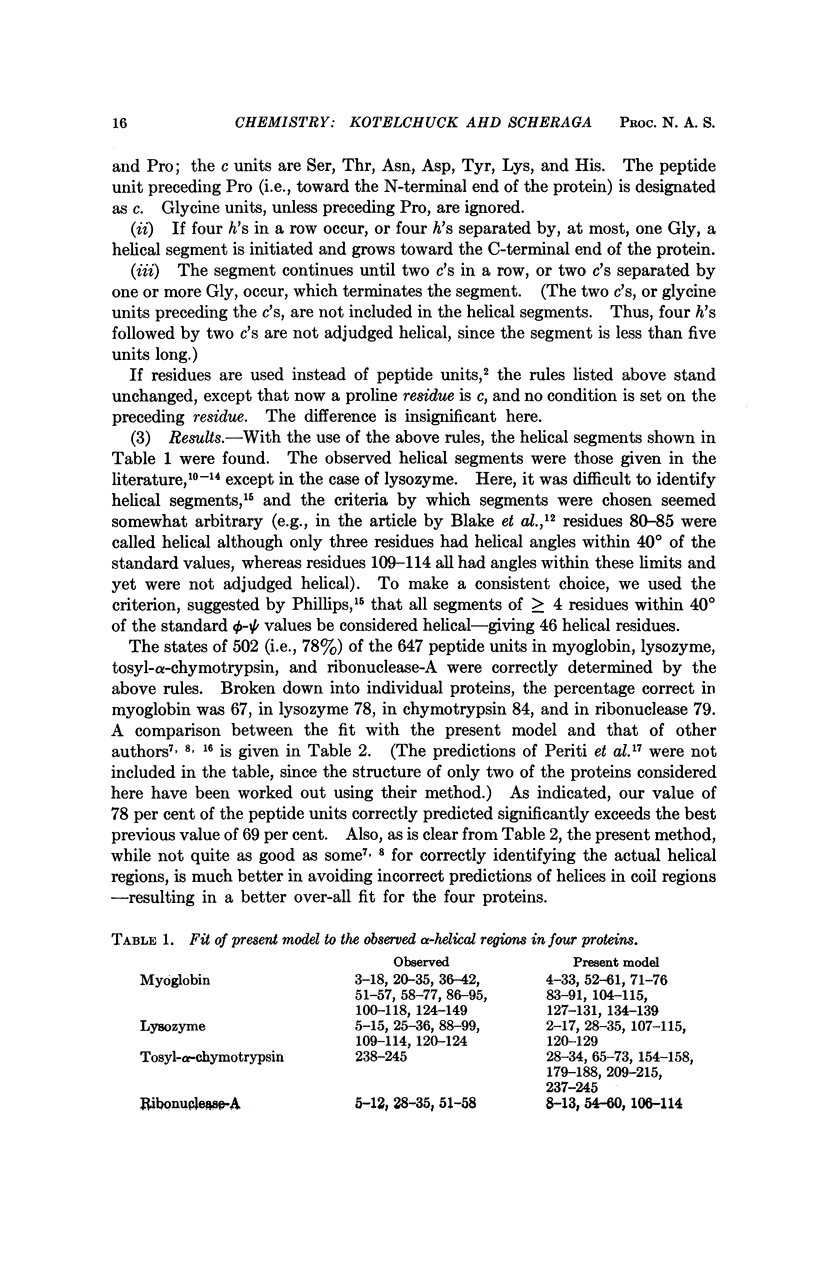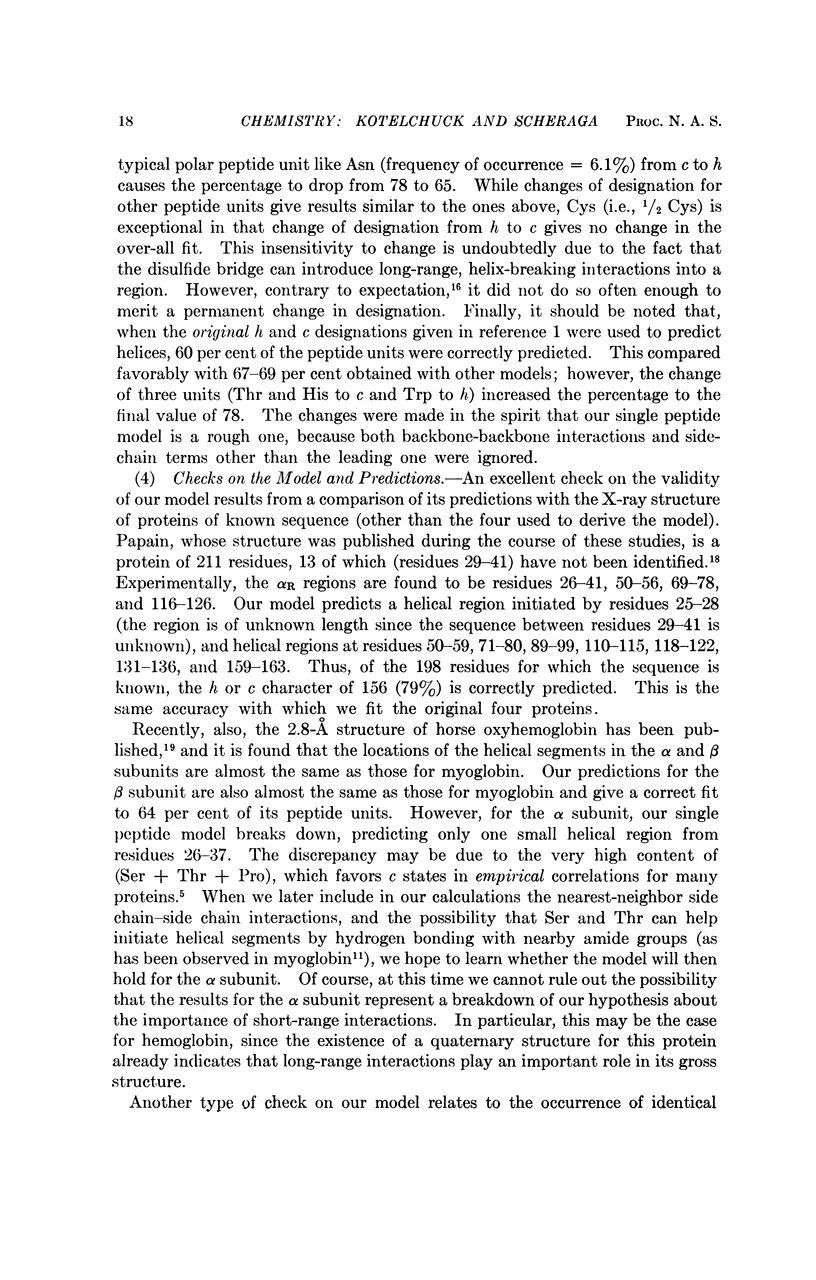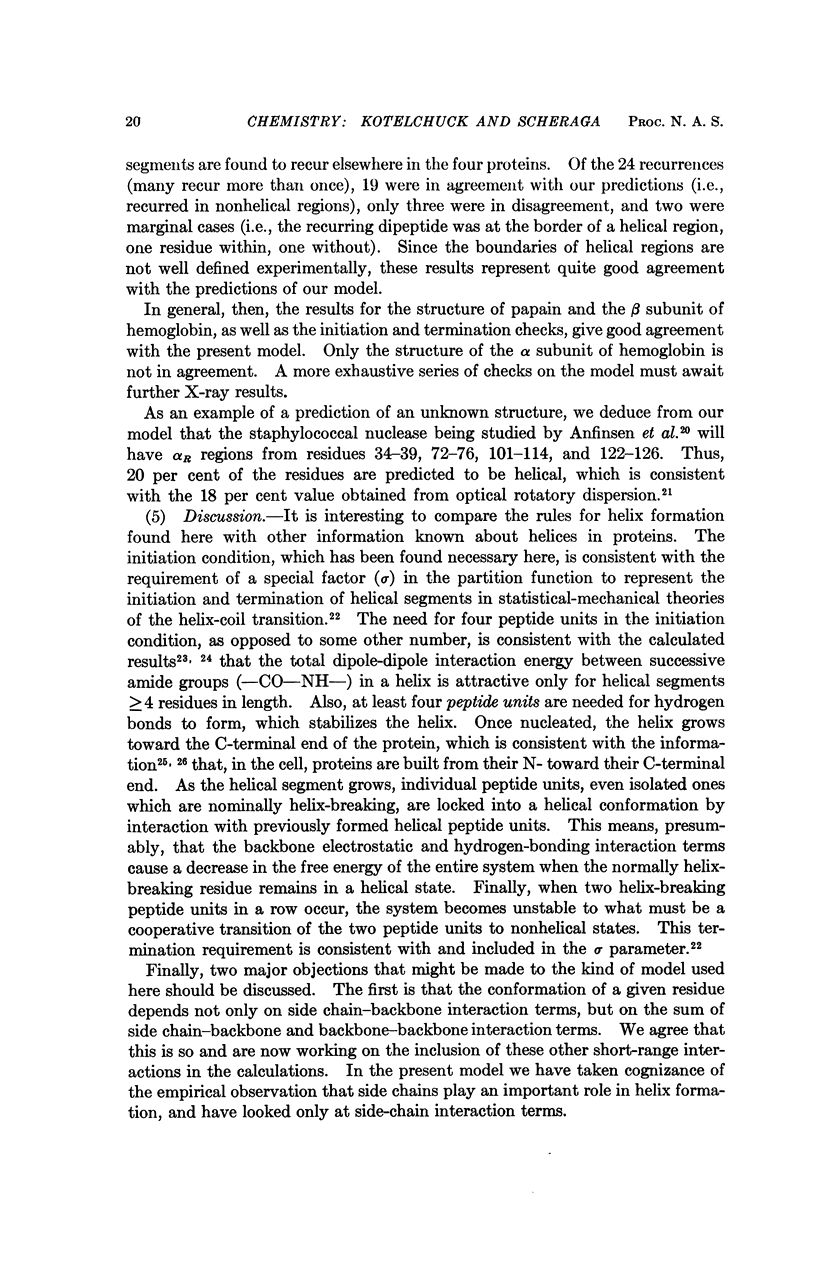Abstract
On the basis of earlier energy computations, the various single peptide units in proteins were designated as helix-making or helix-breaking.1 With the use of these designations, empirical rules for distinguishing between α-helical and non-α-helical regions of proteins have been formulated. These rules include conditions for initiation and termination of a helical segment which, when combined with changes in the designation of three peptide units, correctly identify the helical or nonhelical character of over three fourths of the individual peptide units in four proteins of known amino acid sequence and structure: myoglobin, lysozyme, tosyl-α-chymotrypsin, and ribonuclease-A. The model is discussed, some of its predictions are checked, and further predictions about the structure of various proteins are made.
Full text
PDF







Selected References
These references are in PubMed. This may not be the complete list of references from this article.
- Blake C. C., Koenig D. F., Mair G. A., North A. C., Phillips D. C., Sarma V. R. Structure of hen egg-white lysozyme. A three-dimensional Fourier synthesis at 2 Angstrom resolution. Nature. 1965 May 22;206(4986):757–761. doi: 10.1038/206757a0. [DOI] [PubMed] [Google Scholar]
- CANFIELD R. E., ANFINSEN C. B. NONUNIFORM LABELING OF EGG WHITE LYSOZYME. Biochemistry. 1963 Sep-Oct;2:1073–1078. doi: 10.1021/bi00905a028. [DOI] [PubMed] [Google Scholar]
- DAVIES D. R. A CORRELATION BETWEEN AMINO ACID COMPOSITION AND PROTEIN STRUCTURE. J Mol Biol. 1964 Aug;9:605–609. doi: 10.1016/s0022-2836(64)80232-1. [DOI] [PubMed] [Google Scholar]
- DINTZIS H. M. Assembly of the peptide chains of hemoglobin. Proc Natl Acad Sci U S A. 1961 Mar 15;47:247–261. doi: 10.1073/pnas.47.3.247. [DOI] [PMC free article] [PubMed] [Google Scholar]
- Drenth J., Jansonius J. N., Koekoek R., Swen H. M., Wolthers B. G. Structure of papain. Nature. 1968 Jun 8;218(5145):929–932. doi: 10.1038/218929a0. [DOI] [PubMed] [Google Scholar]
- Epand R. M., Scheraga H. A. The influence of long-range interactions on the structure of myoglobin. Biochemistry. 1968 Aug;7(8):2864–2872. doi: 10.1021/bi00848a024. [DOI] [PubMed] [Google Scholar]
- Gibson K. D., Scheraga H. A. Minimization of polypeptide energy. I. Preliminary structures of bovine pancreatic ribonuclease S-peptide. Proc Natl Acad Sci U S A. 1967 Aug;58(2):420–427. doi: 10.1073/pnas.58.2.420. [DOI] [PMC free article] [PubMed] [Google Scholar]
- Guzzo A. V. The influence of amino-acid sequence on protein structure. Biophys J. 1965 Nov;5(6):809–822. doi: 10.1016/S0006-3495(65)86753-4. [DOI] [PMC free article] [PubMed] [Google Scholar]
- Havsteen B. H. A study of the correlation between the amino acid composition and the helical content of proteins. J Theor Biol. 1966 Jan;10(1):1–10. doi: 10.1016/0022-5193(66)90174-3. [DOI] [PubMed] [Google Scholar]
- KENDREW J. C., WATSON H. C., STRANDBERG B. E., DICKERSON R. E., PHILLIPS D. C., SHORE V. C. The amino-acid sequence x-ray methods, and its correlation with chemical data. Nature. 1961 May 20;190:666–670. doi: 10.1038/190666a0. [DOI] [PubMed] [Google Scholar]
- Kartha G., Bello J., Harker D. Tertiary structure of ribonuclease. Nature. 1967 Mar 4;213(5079):862–865. doi: 10.1038/213862a0. [DOI] [PubMed] [Google Scholar]
- Kotelchuck D., Scheraga H. A. The influence of short-range interactions on protein conformation. I. Side chain-backbone interactions within a single peptide unit. Proc Natl Acad Sci U S A. 1968 Dec;61(4):1163–1170. doi: 10.1073/pnas.61.4.1163. [DOI] [PMC free article] [PubMed] [Google Scholar]
- Low B. W., Lovell F. M., Rudko A. D. Prediction of alpha-helical regions in proteins of known sequence. Proc Natl Acad Sci U S A. 1968 Aug;60(4):1519–1526. doi: 10.1073/pnas.60.4.1519. [DOI] [PMC free article] [PubMed] [Google Scholar]
- Matthews B. W., Sigler P. B., Henderson R., Blow D. M. Three-dimensional structure of tosyl-alpha-chymotrypsin. Nature. 1967 May 13;214(5089):652–656. doi: 10.1038/214652a0. [DOI] [PubMed] [Google Scholar]
- Periti P. F., Quagliarotti G., Liquori A. M. Recognition of alpha-helical segments in proteins of known primary structure. J Mol Biol. 1967 Mar 14;24(2):313–322. doi: 10.1016/0022-2836(67)90336-1. [DOI] [PubMed] [Google Scholar]
- Perutz M. F., Muirhead H., Cox J. M., Goaman L. C. Three-dimensional Fourier synthesis of horse oxyhaemoglobin at 2.8 A resolution: the atomic model. Nature. 1968 Jul 13;219(5150):131–139. doi: 10.1038/219131a0. [DOI] [PubMed] [Google Scholar]
- Prothero J. W. Correlation between the distribution of amino acids and alpha helices. Biophys J. 1966 May;6(3):367–370. doi: 10.1016/S0006-3495(66)86662-6. [DOI] [PMC free article] [PubMed] [Google Scholar]
- Schiffer M., Edmundson A. B. Use of helical wheels to represent the structures of proteins and to identify segments with helical potential. Biophys J. 1967 Mar;7(2):121–135. doi: 10.1016/S0006-3495(67)86579-2. [DOI] [PMC free article] [PubMed] [Google Scholar]
- Taniuchi H., Anfinsen C. B. Steps in the formation of active derivatives of staphylococcal nuclease during trypsin digestion. J Biol Chem. 1968 Sep 25;243(18):4778–4786. [PubMed] [Google Scholar]


